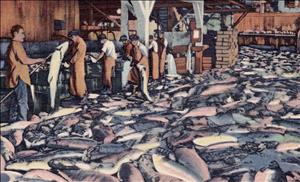On January 8, 2001, the National Marine Fisheries Service (NMFS), a federal agency based in Seattle, implements sweeping regulations intended to protect Puget Sound's dwindling chinook runs. The new "Rule 4(d)" imposes criminal sanctions on actions which harm the fish and authorizes third-party suits by environmental and citizen groups against alleged offenders. The NMFS had declared 14 species or stocks of West Coast salmon and steelhead to be "threatened" under the Endangered Species Act in March 1999.
Implementation of the rule was widely anticipated, and state and local officials had been planning efforts to protect and restore threatened fish stocks for several years. Critics expressed fears that enforcement of Rule 4(d) could seriously curtail a variety of human activities affecting salmon habitat, including suburban development, hydroelectric dams, agricultural practices, and river commerce, and that it could spawn frivolous law suits against businesses, farmers, and local governments.

